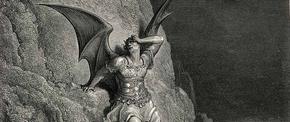The views expressed in our content reflect individual perspectives and do not represent the authoritative views of the Baha'i Faith.
Now let’s talk about the return of Christ—and see if we can figure out what the word “return” really means. Is it literal or symbolic?
This may sound like a dumb question. Why? Because around two billion Christians in the world today believe the return of Christ means that Jesus Christ himself will come back to Earth, defeat Satan, and reign for 1,000 years. Various Christians propose different scenarios for this end-times drama, but the basic elements remain the same.
So why this question, especially if the return of Christ is unquestioned by two billion Christians? To even reconsider what the “return” of Christ actually means, we have to step outside of the received and universal understanding held by Christians historically and currently. The Baha’i teachings offer a different perspective.
The Baha’i teachings say one of the best ways to understand the return of Christ is to understand the “return” of Elijah (also called “Elias,” the Greek form of the Hebrew name, “Elijah”). What’s the connection, you ask? It’s the notion of “return” itself.
Let me tell you a story of how I came to this understanding personally. Although I later earned a Ph.D. in the study of religion from the University of Toronto in 1996 (thanks to the support and encouragement of my dear wife, Nahzy), I wasn’t always an academic. I became a Baha’i when I was 22 years old, on December 15, 1972. I had graduated earlier that year from Pacific Lutheran University (PLU) in Tacoma, Washington.
Having been raised as a Christian—fearing God and Satan at one and the same time—I had some lingering doubts as to whether Baha’u’llah was indeed the return of Christ, as Baha’is claim. After all, the salvation of my soul was at stake. This was a life-and-death matter for me, spiritually speaking.
At that time, I was reading the Baha’i book Some Answered Questions, in which Abdu’l-Baha answers questions posed to him by an interviewer in the early part of the Twentieth Century. Here’s what I read, now in a new translation, in Chapter 33:
The Return of the Prophets
Question: Will you explain the subject of Return?
Answer: Baha’u’llah has set forth a lengthy and detailed explanation of this matter in [The Book of Certitude]. Read it, and the truth of this matter will become clear and manifest. But since you have raised the question, a brief explanation will also be provided here.
We will preface our remarks with the text of the Gospel. It is recorded therein that when John the son of Zacharias appeared and announced unto the people the advent of the Kingdom of God, they asked him, “Who art thou? Art thou the promised Messiah?” He replied, “I am not the Messiah.” They then asked him, “Art thou Elias?” He replied, “I am not.” [Cf. John 1:19–21.] These words clearly establish that John the son of Zacharias was not the promised Elias.
But on the day of the transfiguration on Mount Tabor, Christ explicitly said that John the son of Zacharias was the promised Elias. In Mark 9:11 it is said: “And they asked Him, saying, Why say the scribes that Elias must first come? And He answered and told them, Elias verily cometh first, and restoreth all things; and how it is written of the Son of man, that He must suffer many things, and be set at naught. But I say unto you, That Elias is indeed come, and they have done unto him whatsoever they listed, as it is written of him.” And in Matthew 17:13 it is said: “Then the disciples understood that He spake unto them of John the Baptist.”
Now, they asked John the Baptist, “Art thou Elias?” and he answered, “I am not”, whereas it is said in the Gospel that John was the promised Elias himself, and Christ clearly stated this as well. If John was Elias, why did he say he was not, and if he was not Elias, why did Christ say he was?
The reason is that we consider here not the individuality of the person but the reality of his perfections—that is to say, the very same perfections that Elias possessed were realized in John the Baptist as well. Thus John the Baptist was the promised Elias. What is being considered here is not the essence but the attributes. – Abdu’l-Baha, Some Answered Questions, newly revised edition, pp. 149–150.
Let’s take a closer look at the evidence behind Abdu’l-Baha’s impressive explanation. In the Gospel of John, John the Baptist was asked three distinct questions:
Question (and Answer) #1:
And this is the record of John, when the Jews sent priests and Levites from Jerusalem to ask him, Who art thou? And he confessed, and denied not; but confessed, I am not the Christ. – John 1:19–20.
Question (and Answer) #2:
And they asked him, What then? Art thou Elias? And he saith, I am not.” – John 1:21a.
Question (and Answer) #3:
Art thou that prophet? And he answered, No. … And they asked him, and said unto him, Why baptizest thou then, if thou be not that Christ, nor Elias, neither that prophet?” – John 1:21b, 25.
These three questions, two of which are mentioned by Abdu’l-Baha in the passage above, arise from the expectation, at the time of Christ, not of one Messiah, but of three messiahs: (1) the messianic King (a ruler like King David); (2) the messianic priest (return of Elijah); (3) and the messianic prophet (the return of Moses).
This is proved by evidence in the Dead Sea Scrolls (approx. 150 BC– 68 AD), which speak of the future time when “the prophet comes, and the Messiahs of Aaron and Israel.”*
Early Christian “Christology”—beliefs about who Jesus was—saw Jesus as all three messiahs in one. In other words, Jesus was the messianic king, priest, and prophet combined into one. This means, from the perspective of messianic expectations at the time of Jesus, that he was seen by his first disciples as the “return” of Moses, while John the Baptist, according to Jesus himself, was the “return” of Elijah: “And if ye will receive it, this is Elias, which was for to come.” – Matthew 11:14.
So let me tell you what happened right after I finished reading Abdu’l-Baha’s explanation above: I was stunned—utterly astonished! This profound spiritual insight into what is meant by the “return” of Elijah (and therefore of Christ) was so astounding to me that I experienced this amazement in both body and soul. After I had suddenly realized what “return” means, I suddenly felt back in my bed, and started hyperventilating with surprise and astonishment.
I wanted to tell my spiritual parents about my personal breakthrough in experiencing this spiritual realization. It was around 2:00 a.m. in the morning, cold and damp in Parkland, Washington (the neighborhood where PLU is located). As I wandered the streets, I clasped my hands over the top of my head, and pulled down hard on my head, to keep myself from floating up into the air! Yes, I was lightheaded. But, at that time, I thought that I was lighter than air.
I was spiritually uplifted in mystic transport.
I went to my spiritual parents’ home. I threw some soft pine cones at their bedroom window, in order to wake them up. They did not wake. That was that. I went back to my humble, rented room.
By telling you this story, I hope that you’ll realize how seriously I took this question of what is meant by the “return” of Christ. (I still do.)
So, to sum up, the Baha’i teachings offer a new understanding of the “return” of Christ. It’s not a literal return of Jesus Christ. Why? Because that would be reincarnation — a doctrine foreign to Christianity, historically and doctrinally.
Just as John the Baptist, according to the Bible itself, would come “in the spirit and power of Elias” (Luke 1:17), so Baha’u’llah has come in “in the spirit and power” of Jesus Christ, Baha’is believe.
This understanding of “return” has profound implications for appreciating what Baha’is mean when they refer to Baha’u’llah as the “return” of Christ.
*Note: The Dead Sea Scrolls (approx. 150 BC–68 AD) speak of the future time when three messiahs will appear: i.e.. “the prophet comes, and the Messiahs of Aaron and Israel” (“Rule of the Community,” 1QS 9:9–11; see “Messianic Anthology,” 4QTestimonia (or 4Q175 or 4QTest) and parallels).
The biblical proof-texts behind this expectation of the three messiahs are as follows: (1) the messianic King: Num. 24:15–17; (2) the messianic Priest: Deut. 33:8–11; (3) the messianic Prophet: Deut. 18:18–19. (See John C. Poirier, “The endtime return of Elijah and Moses at Qumran,” Dead Sea Discoveries 10.2 (2003): 221–242 (p. 223).)
Although I’m not sure if the Qumran Covenanters (or “Essenes”) who wrote the Dead Sea Scrolls were actually expecting the “return” of King David, there were certainly expecting the “return” of Moses and Elijah.
You May Also Like
Comments

















References in the Bible to “Mt. Paran” and “Paraclete” refer to Muhammad’s Revelation. Deuteronomy 33.2; Genesis 21.21; Numbers 12.16; Numbers 13.3; Genesis 17.20 refers to the twelve Imams and in the Revelation of St. John, Chap. 11, ...where it mentions two witnesses, it refers to Muhammad and ‘Alí. – Letters from the Guardian to Australia and New Zealand